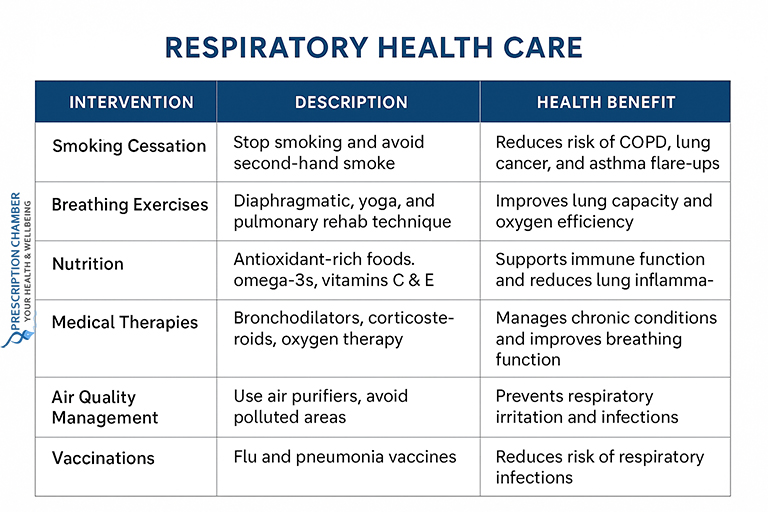So, let’s talk about breathing—because, honestly, what’s more basic than that? Keeping your lungs happy isn’t just about dodging cigarettes and hoping for the best. Respiratory Health Care: It’s about getting off your butt sometimes, moving around, maybe eating something green (yeah, I know, kale again), and not totally ignoring your inhaler if you’ve got asthma or something nastier like COPD. And hey, air pollution? Not your friend. If you can, steer clear. Breathing exercises aren’t just for yoga people, either—they can actually make a difference. Bottom line: take care of your lungs now, and they’ll pay you back big time later. Otherwise? Well, don’t say I didn’t warn you.
Introduction to Respiratory Health Care
Let’s get real about breathing. I mean, you can’t exactly take care of yourself if your lungs are running on empty, right? Keeping your breathing game strong basically keeps the rest of you running, too—energy, immune system, the whole deal. Thing is, with all the junk floating around in the air, people lighting up cigarettes, and the never-ending stress parade, more and more folks are finding themselves huffing and puffing… and not in a good way. So, here’s the deal: this little guide isn’t just about boring facts. It’s stuffed with actual things you can do, nerdy science bits (the good kind), and what the pros have to say so you can keep your lungs happy.
Understanding the Human Respiratory System
Now, about your breathing machine—aka, the respiratory system. It’s not just your lungs, you know. You’ve got the nose doing the first round of air filtering, the windpipe (that’s the trachea), and those branching tubes (bronchi) before air finally lands in your lungs. Inside, there’s a bazillion tiny air sacs (alveoli, if you want to sound smart) where your blood grabs oxygen and dumps carbon dioxide like a bad habit. If you want to dodge stuff like asthma attacks, COPD, or getting knocked out by some nasty infection, you gotta keep this whole setup in working order. Simple as that—easier said than done, but hey, we’ll get there.
Common Respiratory Disorders and Their Causes
Alright, let’s talk about the wild world of breathing and all the ways our lungs can throw tantrums. It’s honestly kind of amazing how many ways things can go sideways, right? Here’s the lowdown, minus the medical gobbledygook.
Asthma
Asthma? Yeah, that one’s infamous. Basically, your airways get all dramatic and inflamed, usually thanks to stuff like pollen, dust, your neighbor’s cat, or just plain old city air. Next thing you know, you’re wheezing and feeling like you ran a marathon after a flight of stairs.
Chronic Obstructive Pulmonary Disease (COPD)
Then there’s COPD—Chronic Obstructive Pulmonary Disease, if you wanna sound fancy. This one creeps up after years of smoking or breathing in junky air. Suddenly, simple things like tying your shoes feel like climbing Everest. Not fun.
Bronchitis and Pneumonia
Bronchitis and pneumonia crash the party too, usually when some virus or bacteria decides to invade your lungs. Expect a hacking cough, fever, and feeling like you got steamrolled.
Allergies and Respiratory Sensitivities
Let’s not forget allergies. Pollen, dust, pet hair—basically, life itself can have you sniffling, wheezing, or rubbing your eyes raw. It’s a cruel joke.
Signs and Symptoms of Poor Respiratory Health
So, how do you spot when your lungs are in crisis mode? Pay attention if you’re short of breath, coughing up a storm for weeks, or if your chest feels tighter than your jeans after Thanksgiving. Wheezing, always catching colds, or just being wiped out all the time? Yeah, your lungs might be waving a red flag. Don’t just ignore it and hope for the best—early action actually helps.
Preventive Measures for Stronger Lungs
Now, if you want to keep your lungs happy, you gotta put in some work. Rule #1: Don’t smoke. Honestly, nothing trashes your lungs faster. Avoid polluted places if you can, keep your hands clean, drink water like it’s your job, get off the couch now and then—basic stuff, but it works. Oh, and roll up your sleeve for your flu shot and pneumonia vaccine, especially if you’re in the “not so young anymore” club.
Best Foods and Nutrients for Respiratory Health
Food helps out more than you think. Pile on the berries, oranges, spinach—anything loaded with antioxidants. Fish and nuts are your friends, thanks to those omega-3s. Vitamins C, D, and E? Stock up. Skip the junk food and salty stuff if you want your lungs to thank you.
The Role of Exercise in Lung Function
Let’s talk exercise. Yeah, I know, but trust me—it does wonders. Walking, swimming, even just taking the stairs helps your lungs work better. And if you’re into yoga or breathing exercises, that’s not just hippie nonsense—it actually helps you get more air in and out, no matter what shape your lungs are in.
Managing Chronic Respiratory Conditions
Managing chronic stuff like asthma or COPD is a juggling act. Gotta stick to your meds, keep up with doctor visits, and probably get cozy with inhalers or oxygen tanks if things get rough. There are rehab programs too—not just for athletes or people on TV, but for real folks who want to breathe easier.
The Impact of Smoking and Air Pollution
Smoking and pollution? Biggest villains in this whole story. Smoking is just brutal, wrecking everything from your tiny air sacs to your odds of dodging lung cancer. Air pollution isn’t much better—think smog, factory fumes, the works. If you can, mask up, grab an air purifier, or just dodge busy streets when the air’s thick.
Respiratory Health in Children and the Elderly
Kids and grandparents? Their lungs are even more precious. Make sure they stay up to date with vaccines, eat well, and don’t hang out in smoky or dusty places. If they start coughing or breathing weird, don’t wait—get it checked out fast.
Medical Treatments and Therapies
Alright, let’s talk about actually dealing with messed up lungs or breathing issues. First off, there’s the classic medical stuff—oxygen tanks if you’re running low, rehab programs that basically make you work out your lungs (yeah, not always fun, but it helps), and then the usual suspects like inhalers, steroids, or antibiotics. Those are the real MVPs when things get hairy.
Natural Remedies and Alternative Approaches
Now, you’ll hear a lot about natural hacks—steaming your face like you’re in a spa, downing herbal teas, tossing turmeric or ginger into everything, or sniffing eucalyptus. Some of it’s legit for making you feel better or calming down inflammation, but let’s be real: this is sidekick territory, not the main act. Yoga and meditation? Awesome for stress, which can mess with your breathing, but don’t go thinking you can om it away if you’re gasping.
When to Seek Medical Help
And hey, here’s the part people try to power through and really shouldn’t—if you’re seriously out of breath, hacking up a lung for days, your chest feels like it’s in a vice, or you’ve got a fever that won’t quit, get to a doctor. Fast. Catching stuff early can be the difference between a quick fix and a hospital bed, so don’t play hero.
Expert Opinion: Improving Global Respiratory Care
Dr. Lisa Montgomery, Pulmonologist – University of Toronto:
Honestly, if you want your lungs to keep doing their thing, you gotta start with the basics: breathe clean air, eat decently, and move your body. Doesn’t have to be crazy—just don’t ignore it. Catch stuff early and you’ll dodge a lot of trouble. You’d be surprised how many lives get saved just by paying attention.
Dr. Ahmed Rahman, Respiratory Therapist – Mayo Clinic:
Look, you can’t just hope things get better on their own. Mixing smart lifestyle changes with stuff that actually works (science, hello!)—that’s the sweet spot. Pulmonary rehab? Absolute game changer. And if folks actually understand what’s going on with their lungs, managing chronic issues gets so much easier. It’s not rocket science, just a little effort and some real talk.
Future of Respiratory Health Care
Alright, let’s talk about where respiratory health care is headed. It’s getting wild out there—AI that practically babysits your lungs, gadgets you slap on your wrist to keep tabs on your oxygen, doctors checking in via video chat while you’re still in your pajamas. Seriously, this isn’t sci-fi anymore, it’s just Tuesday.
The big buzz now? Treatments that actually pay attention to your genes and the junk floating around in your air—not just some generic plan that worked for someone else’s grandma. Imagine your doctor actually caring whether you live next to a freeway or in the woods.
And hey, people are finally waking up to the fact that breathing garbage air is, shocker, not great for your lungs. More folks are pushing for cleaner air and smarter policies so we’re not all wheezing through life. Long story short: tech is leveling up, people are getting louder, and the future of breathing just might not suck (literally).
FAQ on Respiratory Health Care
How can I improve lung health naturally?
Alright, first off—move your body. Seriously, a bit of exercise does wonders. Take deep breaths now and then (not just when you’re panicking, ha). Ditch the cigarettes, obviously. Load up on foods with antioxidants (think berries, dark greens, all that jazz). Oh, and try not to hang out in polluted places, which—unfortunately—is way too many places these days.
Can lungs regenerate after damage?
Here’s the deal: lungs aren’t magic, but they’re not totally hopeless either. They can bounce back a bit if you treat them right—quit smoking, eat better, maybe do some rehab. But if the damage is bad, don’t expect a full comeback. Some scars just stick around, you know?
What are the warning signs of COPD?
Picture this: you’re coughing all the dang time, can’t catch your breath, wheezing like an old accordion, always tired, and getting sick a lot. Big red flags. Don’t mess around—get yourself checked out early, before things spiral.
Are breathing exercises effective for asthma?
Honestly? Yeah, they help. Stuff like belly breathing or even yoga can chill out your airways and make life a little easier. Doesn’t mean you get to toss your meds, though—think of it as backup, not a replacement.
How does air pollution affect lung health?
Let’s just say, breathing in dirty air wrecks your lungs. It inflames ‘em, makes it harder to breathe, and cranks up your risk for all kinds of nasty lung problems. Basically, pollution is the villain in this story.
Conclusion
Let’s be real Respiratory Health Care—if your lungs aren’t happy, the rest of you is probably miserable too. You wanna feel good and stick around? Take care of that breathing apparatus. Eat stuff that’s not just junk, move your body (even if it’s just a walk or dancing like an idiot in your room), and don’t be that person who skips the doctor for years. Catching problems early? Total game changer. And honestly, with all the gunk in the air these days, you gotta stay sharp, maybe even a little paranoid. Bottom line: look after your lungs, or they’ll remind you who’s boss.



